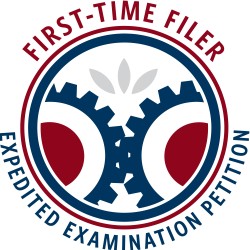 I can’t figure out how I missed this! If you can satisfy fourteen conditions as a first-time patent application filer at the USPTO, you can get your patent application examined faster. Continue reading “First-time filer expedited examination”
I can’t figure out how I missed this! If you can satisfy fourteen conditions as a first-time patent application filer at the USPTO, you can get your patent application examined faster. Continue reading “First-time filer expedited examination”
Professional liability risks of filing in DOCX — two webinars
The USPTO has by now presented over 145 webinars, by now every two days or so, containing pants-on-fire lies about “the DOCX standard” and how safe it supposedly is to file US patent applications according to the USPTO’s DOCX initiative. As of the present time, USPTO’s stated plan is to start charging a $400 surcharge on June 30, 2023 for those filers who fail to use the DOCX initiative. As you can see here, many members of the patent filing community feel that the USPTO has not done a good job of communicating pros and cons for an applicant or practitioner when e-filing in DOCX format.
I presented two webinars recently about the professional liability risks of filing in DOCX. You might wonder whether the people who attended the webinar on April 18, 2023 think that you should attend the upcoming webinars? The answer is “yes”. You can see their evaluation questionnaire answers here.
Watch a recording of either or both of the webinars to get the other side of the story — to appreciate the professional liability risks of filing in DOCX. Continue reading “Professional liability risks of filing in DOCX — two webinars”
How did attendees evaluate the April 18 DOCX webinar?
Recently I presented two webinars (blog article) about the professional liability risks of e-filing using the USPTO’s DOCX e-filing system. (Recordings of the two webinars are now available.) The first-day webinar was for users of Microsoft Word, and the second-day webinar was for users of non-Microsoft word processors. After each webinar, an evaluation questionnaire was sent to the attendees. Here are some of the evaluation results from the April 18 webinar. Continue reading “How did attendees evaluate the April 18 DOCX webinar?”
Attendee polling responses from the DOCX webinars
Recently I presented two webinars (blog article) about the professional liability risks of e-filing using the USPTO’s DOCX e-filing system. The first-day webinar was for users of Microsoft Word, and the second-day webinar was for users of non-Microsoft word processors. During the webinars I did some attendee polling and here are the results.
Summary: For me the most striking polling result was that nearly all respondents felt that the USPTO has not done a good job of communicating pros and cons for a practitioner when e-filing in DOCX format. The answers were:
-
- Yes – 1.5% and zero percent
- No – 94% and 89%
- Not sure – 5% and 11%
Now of course one might imagine some selection bias given that the respondents are people who chose to attend these webinars. And at the time of the polling the respondents had just heard half an hour of discussion of professional risks of the USPTO DOCX e-filing system. On the other hand, by now the USPTO has presented over one hundred forty-five webinars telling applicants and practitioners that DOCX filing is safe, and is better than PDF filing.
Details: Here are the detailed polling results.
Have you done any DOCX filings at the USPTO?
First-day attendees said this:
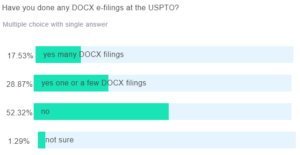
Second-day attendees said this:
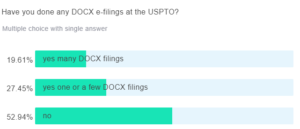
What are your plans about doing DOCX filings in the future at the USPTO?
First-day attendees said this:
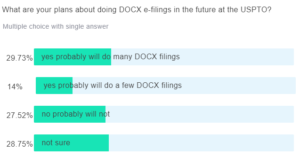
Second-day attendees said this:
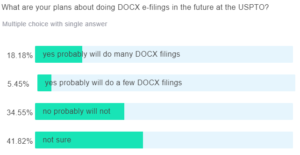
Do you feel that the USPTO has done a good job of communicating pros and cons for a practitioner when e-filing in DOCX format?
First-day attendees said this:

Second-day attendees said this:

Have you experienced conversion problems with your DOCX filings?
First-day attendees said this:
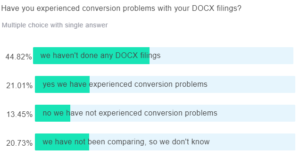
Second-day attendees said this:
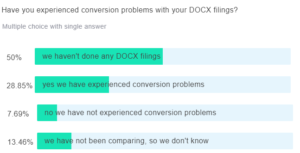
What I find most striking is the percentage of DOCX filers (21% and 13%) who report that they don’t know if there have been conversion problems because they don’t check for it.
What word processors are sometimes involved with your US patent applications? (check as many as apply)
Second-day attendees said this:
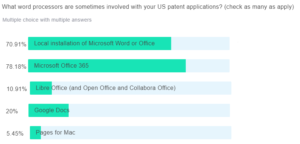
And they also said this:
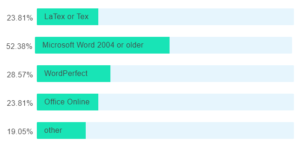
So the word processor types that were reported as being involved with patent application drafting, in descending order, were:
-
- 78% – Microsoft Office 265
- 71% – local installation of Microsoft Word or Office
- 52% – Microsoft Word 2004 or older
- 29% – Wordperfect
- 24% – LaTex or Tex
- 24% – Office Online
- 20% – Google Docs
- 11% – Libre Office (and Open Office and Collabra Office)
- 5% – Pages for Mac
- 19% – other
Recordings of the webinars are now available for viewing.
How successful have USPTO’s DOCX training webinars been?
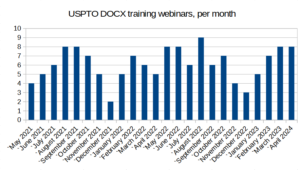
The USPTO has by now presented at least one hundred forty-five webinars urging applicants and practitioners to e-file their US patent applications in DOCX format instead of PDF format. This has amounted to more than six webinars per month in the past 24 months (see graph at right). To promote these webinars, the USPTO has carried out at least fifty email blasts amounting, I imagine, to well over half a million outbound email messages. What is USPTO’s success rate at convincing applicants and practitioners to switch from PDF to DOCX? Continue reading “How successful have USPTO’s DOCX training webinars been?”
Here are the recordings of the two recent webinars on risks of DOCX e-filing
Here are the recordings of the two recent webinars on risks of DOCX e-filing. (Update: two more recent webinars took place and recordings of the more recent webinars are now available.)
- Professional Liability Risks of Filing in DOCX – for users of Microsoft Word – Tuesday, April 18, 2023. The recording is now available and you can see it here. The duration is 1 hour and 35 minutes. You can download the presentation materials here.
- Professional Liability Risks of Filing in DOCX – for users of non-Microsoft word processors — Wednesday, April 19, 2023. The recording is now available and you can see it here. The duration is 1 hour and 31 minutes. You can download the presentation materials here.
Here is the recording of today’s webinar on risks of DOCX e-filing
Update: two more recent webinars took place and recordings are now available.
Hello folks. Today I presented a webinar on the risks of using the USPTO’s DOCX e-filing system. The recording is now available and you can see it here. The duration is 1 hour and 35 minutes. You can download the presentation materials here.
Keep in mind there will be another live webinar tomorrow on mostly the same subject matter. Click here for more information or to register.
Join the over 900 who have registered for the webinars about DOCX patent filing risks
Update: two more recent webinars took place and recordings are now available.
By now, over 900 have registered for these two webinars:
-
- Professional Liability Risks of Filing in DOCX – for users of Microsoft Word – Tuesday, April 18, 10AM Mountain Time.
- Professional Liability Risks of Filing in DOCX – for users of non-Microsoft word processors — Wednesday, April 19, 10AM Mountain Time.
The webinars are free of charge. The email addresses include attendees from many Fortune 200 companies and from most of the well-known patent firms in the US.
Oddly, no one with an “@uspto.gov” email address seems to have registered.
For more information or to register, click here.
Reducing professional risk with USPTO’s DOCX initiative — two webinars
Update: two more recent webinars took place and recordings are now available.
The USPTO continues to present webinars, by now every two days or so, containing pants-on-fire lies about “the DOCX standard” and how safe it supposedly is to file US patent applications according to the USPTO’s DOCX initiative. As of the present time, USPTO’s stated plan is to start charging a $400 surcharge on June 30, 2023 for those filers who fail to use the DOCX initiative.
Attend either or both of two upcoming webinars to get the other side of the story. Attend either or both of the two webinars to appreciate the professional liability risks of filing in DOCX. Attend either or both of the two webinars to learn how to reduce the professional liability risks.
To learn more about the webinars, or to register, click here.
What ChatGPT says about USPTO’s DOCX initiative
Continue reading “What ChatGPT says about USPTO’s DOCX initiative”
